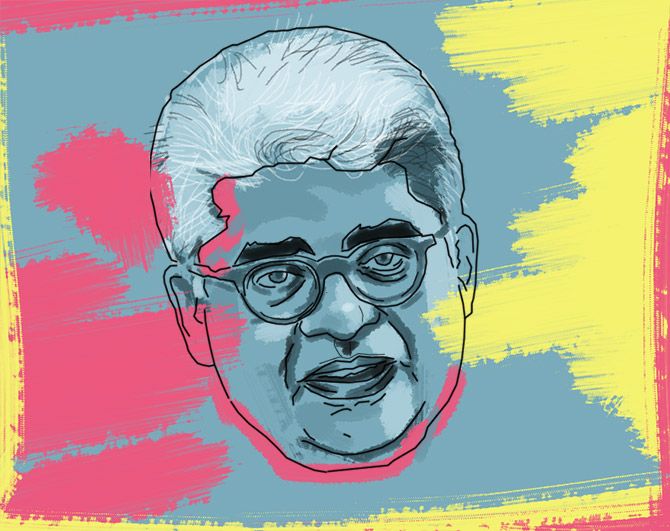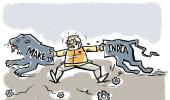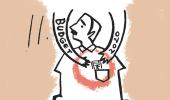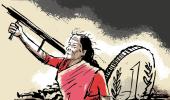'Even without major reforms, with a business as usual scenario, and with current inflation trends, we should be clocking around 11 to 12 per cent nominal growth.'
'That is not happening and is a source of worry,' Rathin Roy tells Arup Roychoudhury.
Illustration: Dominic Xavier/Rediff.com

The call to Rathin Roy to set up this lunch leads to a fervent discussion on the futility of going to overpriced eateries in central Delhi, especially when there are so many state government bhawans and niwases, whose in-house canteens serve amazing fare from their respective regions.
"We have to do it in one of those places," says Roy, director, National Institute of Public Finance and Policy, and a former member of the Economic Advisory Council to the Prime Minister (EAC-PM).
We settle on Assam House in Chanakyapuri, Delhi. Not to be confused with the better-known Assam Bhawan a few kilometres away, the Assam House's restaurant, Gam's Delicacy, is one of those lesser-known gems that serves scrumptious Assamese fare at very reasonable rates.
As we walk in, the place appears quite full for a Friday afternoon. A waiter places complimentary servings of clear hot soup, with pepper and ginger, perfect for the Delhi winter as we settle down.
Within minutes, Roy and I are in an intense discussion with the waiter. There are just so many chicken, fish, pork and duck options, and we would ideally like to try all of them.
We settle on raw papaya khar (a dish made with banana peel ash), daal, pork fry, duck curry with sesame seeds, and plain rice. I order some lime soda, while Roy is fine with just plain water.
That out of the way, we get down to brass tacks. Readers would know Roy for his work as a member of the Seventh Pay Commission, the Fiscal Responsibility and Budget Management Committee, as a former advisor to Prime Minister Narendra Damodardas Modi, and as a critic of the Centre's fiscal policies, especially the finance ministry's propensity to hide the extent of its budgetary gaps.
But not many would know that both his parents were journalists and he is married to one.
"My father was, like you, a reporter. In fact, my parents met at the Economic & Political Weekly in Mumbai. My mother is from Andhra Pradesh, my father's family is from Bengal, but has been settled in Maharashtra for more than 100 years. So I consider myself a Maharashtrian and Marathi as my mother tongue," he says.
Roy did part of his schooling in Delhi, when his father was one of the senior editors at The Economic Times.
He went to St Stephen's College, then Jawaharlal Nehru University and, in the late eighties, taught briefly in Shriram College and then worked as a stockbroker in Mumbai.
Then in 1989, he moved to Cambridge University to pursue a PhD, after which he taught at the School of Oriental and African Studies at the University of London.
By the start of the new millennium, Roy had switched careers and had joined the United Nations Development Programme in New York.
Most of his work there was focussed on calling out what he terms the damage done by the IMF and the World Bank on developing economies by imposing unreasonable structural and fiscal adjustments on them.
He dubs such measures as neo-colonial. "I think I was moderately successful in turning that tide."
By 2013, when he was actually doing his second stint at the UN -- this time in Brazil and Thailand -- he was offered the role of director of NIPFP, and continues in that role in his second and last term.
"When I returned, I realised that given how tough it is to work in this system, coming back on a sabbatical was never going to work. It had to be full-time."
Our food arrives. We ditch the cutlery and use our hands. "Just like you can never enjoy Indian food with a fork and a knife, you cannot have the distance afforded by a sabbatical as an economist. You have to come back and immerse yourself full time," he quips. The food is quite good, and the pork and duck are extraordinarily so.
"It is my view that very few low-hanging fruits are left for policymakers to work with. Painful medium-term steps will have to be taken to get the economy on the growth path that is both inclusive and sustainable," Roy says, while talking about the factors that have to be considered in the daily push and pull of economic policymaking.
"Short-term steps are necessary to boost the economy. But those short-term steps without a simultaneous medium-term strategy mean nothing. Which is why I am very disappointed when the instrumentation of economic policymaking continues to be short-sighted and short-term," he says, adding that there is "no political will to think medium-term".
The fact is, Roy has long been a proponent of a credible medium-term budgeting framework, most clearly through his work in the FRBM panel during the Modi government's first term.
While he is a supporter of the FRBM Act and its emphasis on the medium-term fiscal deficit target of 3 per cent of GDP, he is disappointed that Budget-makers don't take it as seriously as they should.
After the 2019-2020 Budget was presented last July, Roy, who was then a member of EAC-PM, was one of those who vociferously criticised the now dead proposal to issue overseas sovereign bonds, and also said that India was staring at a 'silent fiscal crisis'.
This was because although the provisional actual revenue and expenditure numbers for 2018-2019 were available, the finance ministry had based its FY20 numbers on revised estimates of FY19.
This led to what Roy calls a Rs 1.6 trillion hole in the Budget. "What it pointed to me was a terrible incompetence on the part of the then Budget administration," he says.
"None of these have consequences for the bureaucracy. This is a system unwilling to accept greater accountability," he says.
"When it is business as usual, one can perhaps get away with not revealing the true picture of the fiscal situation. But in times of stress we cannot afford that. The lack of transparency promotes lack of accountability."
In October, the EAC-PM was reconstituted, and Roy and economist Shamika Ravi of the Brookings Institution were not retained. It is widely believed that was a result of their criticism of the finance ministry.
So, is the Modi government averse to good advice? "It is getting the advice it seeks. This means it got advice from me when it sought it, and now it is seeking advice from those it is seeking from now."
Roy is quick to point out that this phenomenon is not restricted to only the Modi government.
He is a supporter of some of the steps taken by the current dispensation, such as the implementation of the goods and service tax, the Insolvency and Bankruptcy Code, and the stress on budgetary discipline in the early years of this government.
However, just like previous administrations, there is a lack of comprehensive thinking to carry out structural reforms.
"Even without major reforms, with a business as usual scenario, and with current inflation trends, we should be clocking around 11 to 12 per cent nominal growth. That is not happening and is a source of worry," he says.
So what next for Rathin Roy?
"I came back to this country because I am a patriot. I believe egalitarianism only comes in when people participate in making the economy grow. The rest of my life will be devoted here. I am back for good. I have no plans of moving abroad again," he says, as we finish what has been a fantastic, and, quite frankly, a ridiculously inexpensive meal.











